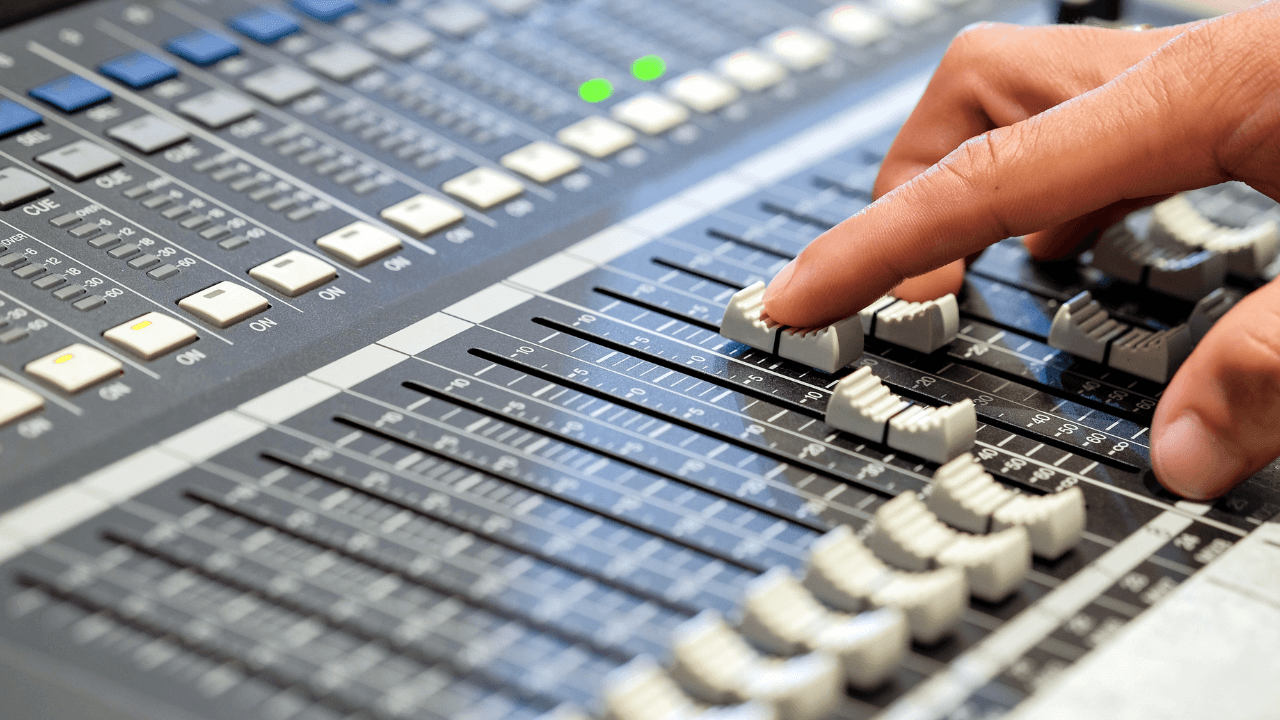Language:
15 Side Hustle Ideas for Musicians

It’s no secret that the music industry can be tough to break into and even tougher to make a sustainable income from. In fact, according to a study by the Future of Music Coalition, over 42% of musicians earn less than $10,000 per year from their music-related activities.
This is where side hustles come in.
A side hustle is any additional job or business venture taken on alongside one’s main source of income. They allow musicians to diversify their income streams and supplement their earnings while pursuing their dreams.
With the rise of digital platforms and technology for freelancing and entrepreneurship, you have more opportunities than ever before.
So, if you are a musician looking to make some extra cash on the side, this blog is for you. We have compiled a list of the top 17 side hustle ideas specifically tailored to your talents.
Whether you’re a singer, songwriter, or instrumentalist, there’s something here for everyone.
So grab your instrument and get ready to start earning some serious dough with these innovative money-making opportunities for young and creative minds!
1. Teaching Music
With the increasing demand for online learning due to the pandemic, there has never been a better time for musicians to offer lessons or tutoring services online.
If you have a talent for teaching and love sharing your musical skills with others, offering music lessons could be a lucrative side hustle. You can teach various instruments and styles of music or even offer vocal coaching services.
Also, musicians have never had a better time giving lessons or tutoring services since they can do it online. With the rise of online platforms and video conferencing tools, you can nowadays reach a global audience from the comfort of your home.
Whether you’re teaching an instrument or offering production tutorials, this side hustle allows you to work on your own schedule and inspire more students.
In addition to online sessions with students, you can offer workshops at schools or community centers, teaching summer camps, or music festivals. These workshops or conferences help you gain new teaching techniques and stay up-to-date with the latest trends in the industry.
Not only will this make you a more effective teacher, but it can also attract new students looking for innovative and engaging lessons.
2. Performing at Events and Weddings
There is always a demand for live music to enhance the atmosphere and create an unforgettable experience. From private parties to corporate events and weddings, booking a gig can be a lucrative side hustle for musicians looking to earn extra income. Another advantage is the potential for repeat or new business.
Once you establish yourself as a reliable and talented musician, clients will likely hire you for future events or even recommend you to others. Moreover, it allows musicians to showcase their skills to a diverse audience.
This can lead to a steady stream of gigs throughout the year, providing a stable source of income.
It will also help you gain exposure and provide an opportunity to expand one’s fan base.
3. Writing and Recording Jingles
Jingles, or commercial songs, are catchy tunes used in advertisements to promote a product or service. They have been around since the early days of radio and are still a popular marketing tool today.
They are usually 30 seconds at maximum and should have a memorable tune that sticks in people’s minds. They are an essential part of marketing campaigns since they are short, memorable, and evoke positive emotions in listeners while conveying the brand’s message clearly.
Writing and recording jingles can be profitable for musicians looking to diversify their income streams. However, remunerations can vary depending on project scope, usage rights, and experience level, so negotiating these details upfront before starting work on any project is essential.
Therefore, creating a portfolio that includes samples of your previous work or mock commercials showcasing your jingle-writing skills when pitching for jingle-writing gigs is best.
You can contact advertising agencies or production companies that create commercials for various brands. These agencies often hire freelance musicians to compose jingles for their clients’ commercials.
Another option is to join online platforms specifically designed for freelancers, where you can offer your services as a jingle writer.
4. Creating and Selling Merchandise
Creating and selling merchandise is a popular side hustle for many musicians, allowing them to earn extra income, promote their brand, and connect with fans. It allows fans to show their support and participate in the musician’s journey while receiving a tangible item in return.
You can sell various types of merchandise, but the key is to find items that align with your brand and music style and appeal to your target audience.
One popular item among musicians is t-shirts or caps featuring their band name or logo. These can be sold at concerts, online stores, or local retailers. T-shirts are relatively inexpensive to produce and can generate a decent profit margin for the musician.
Plus, they serve as walking advertisements for your brand wherever they are worn.
Don’t limit yourself to traditional merchandise—get creative! You may want to consider selling one-of-a-kind items, which will attract attention and offer fans something unique they can’t find anywhere else.
While this provides another source of income, it will also be subject to the scrutiny of the Internal Revenue Service (IRS).
Luckily, you can claim several tax deductions available for musicians to save time and protect your hard-earned revenue.
5. Live Streaming Concerts
The benefits of live-streaming concerts for musicians are numerous. Firstly, it provides a way to reach a wider audience beyond those who can attend physical shows.
This means that even if you have a small fanbase in your local area, you could potentially attract viewers from all around the world. Additionally, there are no limitations on venue capacity or ticket sales, allowing for potentially higher earnings.
Another advantage is the low cost of production compared to traditional live performances. You don’t need to rent out a venue or hire staff for sound and lighting – you only need a good internet connection and basic equipment such as a webcam and microphone.
This makes it an accessible option for musicians at any level – whether you’re just starting out or already established in your career.
In terms of earning potential, musicians can monetize their live streams in several ways. One common method is ticket sales—viewers purchase tickets beforehand or make donations during the show.
Another option is sponsorships or brand partnerships, where companies pay to feature their products or services during the concert.
Musicians can also offer exclusive merchandise or experiences, such as virtual meet-and-greets, for fans to purchase.
6. Producing and Selling Beats or Instrumentals
With the rise of digital music platforms and the increasing demand for original music, there has never been a better time to tap into this market. Beats refer to a song’s backing track or instrumental part, while instrumentals are purely musical compositions without accompanying vocals.
These can range from simple melodies to complex arrangements with multiple layers of instruments.
So, how can you get started producing and selling beats or instrumentals? The first step is to invest in good-quality Digital Audio Workstation (DAW) software such as Ableton Live, FL Studio, or Logic Pro.
This will allow you to create professional-sounding tracks with various virtual instruments, effects, and mixing capabilities.
Once you have some tracks ready, it’s time to start promoting them. One effective way is through social media platforms like SoundCloud, YouTube, and Instagram. Another option is to sell your beats on online marketplaces specifically designed for producers like BeatStars or Airbit.
These platforms allow buyers to purchase licenses for your beats easily with automated contracts and royalty tracking.
Also, you can claim one-time or recurring tax deductions for the entertainment industry on these platform purchases.
7. Offering Music Production Services
In today’s digital age, music production has become more accessible. So, what exactly does a music producer do? A music producer oversees all aspects of the recording process – from selecting songs and arranging them to coaching musicians and overseeing the final mix and master.
They work closely with artists to bring their musical vision to life and ensure that the final product meets industry standards.
With the rise of home recording studios and online distribution platforms, musicians can create their own music and offer their production services to others. By offering their services to other artists, musicians can not only earn extra income but also gain valuable experience in the industry.
You already have the skills and knowledge necessary to produce music as a musician. So, if you have a passion for music and a knack for producing high-quality tracks, offering your services as a music producer can be a lucrative side hustle.
It allows you to earn extra income and provides an outlet for creativity and collaboration with other artists.
8. Busking or Street Performing
Busking, also known as street performing, is a popular side hustle for musicians looking to earn extra income while showcasing their talents. This form of public performance has been around for centuries and is a viable option for musicians in today’s digital age.
You can find opportunities to attract an audience and make some money anywhere, from a busy street corner to in a popular park or at a local market. Additionally, busking allows you to reach a diverse audience that may not have access or exposure to your music otherwise.
Another perk of busking is the potential for high earnings. While it may not provide a steady income stream like traditional gigs or performances, successful buskers can make good money with just a few hours of playing time.
Aside from earning cash from tips given by appreciative listeners, buskers can monetize their performances in other ways.
Many musicians use their time on the streets as an opportunity to sell merchandise, such as CDs or merchandise featuring their name or brand logo.
This largely depends on the location and type of performance since some areas are more lucrative than others. Consider factors such as weather conditions and peak times when choosing your location – these can greatly impact your audience size and potential earnings.
Knowing any legal regulations or permits required for street performance in your area is also essential.
9. Freelance Composition
As a musician, finding ways to earn extra income can be challenging. Gigs may not always be available, and the music industry can be unpredictable. Freelance composition involves writing or creating music for other artists, businesses, or organizations.
It allows musicians to use their skills and creativity to create unique pieces of music while getting paid for it. Since you control your schedule, you can continue pursuing your passion for music while earning extra income.
To start freelancing as a songwriter/composer, you must build an online portfolio showcasing your work. This could include demos of original compositions or songs you have written for other artists.
Networking is crucial, so attend industry events, connect with other musicians and producers, and join online communities. This will help you get your name out there and potentially lead to collaborations or referrals for projects.
When pricing your services as a freelance songwriter/composer, consider factors such as the project’s complexity, usage rights (whether the client wants exclusive rights or only temporary usage), and turnaround time.
You may also want to research what other freelancers charge to stay competitive.
10. Voiceover Services
As a musician, you already possess the skills needed to excel in this field – a great voice, an ear for tone and pacing, and the ability to convey emotion through your vocal delivery.
With the rising demand for voiceovers in various industries, such as advertising, audiobooks, podcasts, and even video games, there is no shortage of opportunities for musicians to use their talents and earn extra income.
As a musician, you can offer voiceover services by lending your unique vocal qualities to these productions. Many types of voiceover work are available that cater to different styles and genres – from character voices to narrations to singing jingles.
One of the key benefits of offering voiceover services as a side hustle is its flexibility. This means that you can prioritize your musical commitments while still earning extra income on the side.
To offer voiceover services, you need a professional recording setup. This includes a good-quality microphone, audio interface or mixer, headphones, and recording software. You may also need soundproofing equipment if you work from home.
Once you are ready, you can contact production companies or market yourself as a voiceover artist is through online platforms, such as Fiverr or Upwork, where clients post job listings for voiceover work.
11. Audio Engineering Services
With the rise of independent musicians and the increasing demand to hire specialized engineering services for high-quality recordings. It refers to the technical and creative processes of recording, mixing, and mastering music. This crucial aspect of the music industry requires specialized skills and knowledge.
For musicians looking to earn extra income, offering music production or audio engineering services can be a lucrative side hustle. It allows you to use your passion for music, hone your skills, and work with other artists.
You will work closely with artists to create their desired sound as an audio engineer. This involves recording instruments and vocals, adding effects and edits during mixing sessions, and finalizing the track through mastering techniques.
Apart from working directly with artists, you can also offer online remote mixing and mastering services. Many musicians prefer this option as they can send their tracks digitally without traveling to a studio location.
In addition to traditional music production services, you can explore opportunities for commercials or audiobooks.
You could also offer sound design services for films or video games if you have experience working with different media types.
12. Ghostwriting
Ghostwriting is a popular side hustle for musicians seeking extra income while utilizing their musical skills and knowledge. It involves writing songs, lyrics, or even entire albums for other artists without receiving credit or recognition.
While some may view ghostwriting as a controversial practice in the music industry, it can be a lucrative opportunity for musicians to make money, gain valuable experience, and expand their network.
One of the main benefits of ghostwriting is the potential to earn a significant amount of money. As a ghostwriter, you can negotiate your rates with clients based on your experience and expertise.
If you have already established yourself as a skilled musician, you can charge higher fees for your services. Additionally, since ghostwriters do not receive public credit for their work, they often have more freedom in setting their rates than traditional songwriters, who must follow industry standards.
There are several ways in which musicians can find ghostwriting opportunities. One option is to network within the industry and connect with other artists, labels, or producers who may need help with their music.
Another way to find ghostwriting gigs is through online platforms such as Fiverr, Upwork, or SoundBetter.
These websites connect musicians with clients looking for songwriters and offer a variety of projects ranging from single songs to full albums.
13. Music Transcription or Arrangement Services
Music transcription or arrangement services can be lucrative side hustles for musicians looking to earn extra income. Transcription involves listening to a piece of recorded music and writing the notes in sheet music form.
On the other hand, arrangement involves taking an existing piece of music and changing it somehow. This could mean adapting it for a different instrument or ensemble, adding new parts or harmonies, or creating a new version of the song with a unique twist.
Transcribing or arranging music can be a tedious and time-consuming process for those who are not musically trained. This is where your expertise comes in as a musician.
Your ability to accurately transcribe complex melodies, harmonies, and rhythms will save others the hassle of figuring it out themselves. It can also be helpful for composers who want to study the techniques used in a certain piece of music but don’t have access to sheet music.
So, who would someone need these services? You can work with various clients, such as bands, solo artists, choirs, musical theater productions, and more.
You could offer your services online through freelance platforms like Fiverr or Upwork, where clients worldwide can hire you for your skills.
However, having a strong knowledge of musical theory and notation and proficiency in playing at least one instrument is important. You should also have experience using software programs such as Finale or Sibelius, which are commonly used for creating sheet music.
14. Music Journalism
Music journalism is a side hustle that combines two passions—music and writing. It involves creating engaging content about the music industry, including reviews, interviews, news articles, and opinion pieces.
Even many established musicians have successfully ventured into the field of music journalism. This adds another layer to their creative pursuits and supplements their income outside of performing and recording.
One of the main ways to make money as a music journalist is by writing for online publications and websites. Many popular music blogs and magazines are constantly looking for new writers who can provide fresh perspectives on current trends in the industry.
With the rise of digital media, there are now more opportunities than ever for musicians to get paid for each published article.
Another avenue for earning income as a music journalist is through freelance writing projects. You can offer your services to artists or record labels looking for press releases or biographies or even work with event organizers who need coverage of their concerts or festivals.
In addition to traditional written content, there is also a demand for video content like reviews or interviews with artists.
It can open up sponsorship opportunities for companies advertising their products or services through your channel.
15. Music Licensing Services
One of the most lucrative ways musicians can earn extra income through their musical talents is by offering licensing services. Music licensing grants permission for a song or music to be used in various media platforms such as film, television, commercials, video games, and more.
This means that companies or individuals who want to use your music will pay you a fee for the rights to use it.
As a musician, you can offer music licensing services where you represent artists and their catalog of songs to potential buyers like filmmakers or advertising agencies.
Alternatively, if you have original music yourself that you own the rights to, you can license it directly to clients through online marketplaces like Musicbed or AudioJungle.
There are several types of licenses that you can offer as a musician: sync licenses, mechanical licenses, and performance licenses.
Sync licenses allow your music to be synchronized with visual media such as films and TV shows; mechanical licenses enable others to reproduce and distribute your music; and performance licenses permit live performances of your songs in public venues.
Let the Money Sing With doola!
As a musician, you only have to pick a side hustle that suits your skills to earn the consistently high income you want and deserve. However, it will be a matter of time before your side hustle takes off and you’re making significant money.
At that time, thinking about business formation, taxation, and financial management may be beneficial.
However, setting up a legal business structure, tracking income and expenses, and handling taxes can become bothersome for creative minds like yours. This is where doola comes into the picture.
We do all those things and more so you can focus on your passion and let us handle the rest for you.
Get started with us today and register your new LLC with a few simple steps with doola – a business-in-a-box solution for small businesses and entrepreneurs.
Book a free consultation today to understand how we can handle your administrative tasks while you handle your business.














